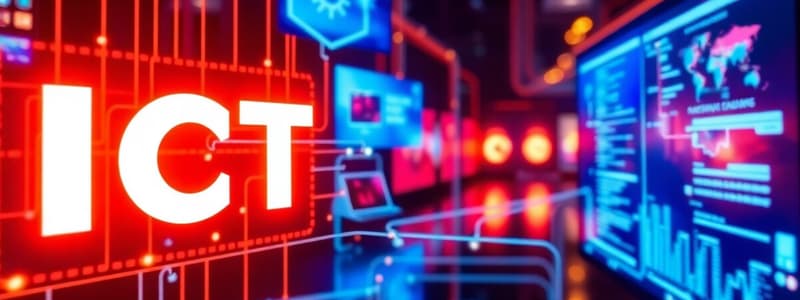Podcast
Questions and Answers
Which emerging technology is noted for being transformative?
Which emerging technology is noted for being transformative?
- Blockchain technology
- Virtual reality
- Artificial Intelligence
- 3D printing (correct)
What is considered a key factor in effectively leveraging ICT?
What is considered a key factor in effectively leveraging ICT?
- Technological infrastructure
- Social media presence
- Government policies
- Human capital (correct)
What impact does ICT have on globalization?
What impact does ICT have on globalization?
- It isolates cultures from one another.
- It promotes local economies exclusively.
- It facilitates instant communication and information sharing. (correct)
- It reduces the need for trade.
Which ethical consideration involves protecting user data?
Which ethical consideration involves protecting user data?
What is meant by algorithmic bias in ICT?
What is meant by algorithmic bias in ICT?
What does ICT encompass?
What does ICT encompass?
Which of the following is considered a hardware component of an ICT system?
Which of the following is considered a hardware component of an ICT system?
How does ICT support business and commerce?
How does ICT support business and commerce?
What is one of the major benefits of ICT?
What is one of the major benefits of ICT?
Which challenge is associated with ICT?
Which challenge is associated with ICT?
How is healthcare being transformed by ICT?
How is healthcare being transformed by ICT?
What factor stimulates economic growth related to ICT?
What factor stimulates economic growth related to ICT?
What is a crucial area of focus for the future development of ICT?
What is a crucial area of focus for the future development of ICT?
Flashcards
ICT
ICT
Information and Communication Technology; encompasses all forms of communication and information processing using technology, including hardware, software, and networks.
Hardware
Hardware
The physical parts of a computer system, like the computer itself, printer, and phone.
Software
Software
Sets of instructions that tell hardware what to do, including operating systems, applications, and games.
Networks
Networks
Signup and view all the flashcards
Digital Divide
Digital Divide
Signup and view all the flashcards
Security Risks
Security Risks
Signup and view all the flashcards
ICT Benefits
ICT Benefits
Signup and view all the flashcards
ICT Applications
ICT Applications
Signup and view all the flashcards
ICT Societal Impact
ICT Societal Impact
Signup and view all the flashcards
ICT and Economic Opportunities
ICT and Economic Opportunities
Signup and view all the flashcards
Human capital in ICT
Human capital in ICT
Signup and view all the flashcards
Data Privacy
Data Privacy
Signup and view all the flashcards
Algorithmic Bias
Algorithmic Bias
Signup and view all the flashcards
Study Notes
Introduction to ICT
- ICT encompasses all forms of communication and information processing using technology.
- This includes hardware (computers, phones, etc.), software (applications, programs), and networks (connections between devices).
- ICT plays a crucial role in modern society, influencing various aspects of life.
Key Components of ICT
- Hardware: physical components of a system, such as computers, printers, and smartphones.
- Software: sets of instructions that tell hardware what to do. Examples include operating systems, applications, and games.
- Networks: connections that allow devices to communicate and share information, such as the internet and local area networks (LANs).
Applications of ICT
- Information storage and retrieval: computers and databases facilitate storing vast amounts of data and retrieving it easily.
- Communication: ICT tools enable rapid and widespread communication, from email to video conferencing.
- Business and commerce: e-commerce, online transactions, and data processing significantly impact business operations.
- Education: ICT supports online learning, interactive simulations, and virtual classrooms.
- Healthcare: electronic health records, telemedicine, and diagnostic tools are transforming healthcare services.
- Entertainment: ICT allows for the creation and consumption of digital media (movies, music, games) in new ways.
- Social interaction: social media platforms and online communities have become integral to social interaction.
Benefits of ICT
- Increased efficiency and productivity: automation and streamlined processes.
- Enhanced communication and collaboration: enables global connectivity and teamwork.
- Access to information and knowledge: readily available information sources.
- Economic growth: stimulates innovation and entrepreneurship in various industries.
- Improved quality of life: facilitates access to services and information.
Challenges of ICT
- Digital divide: unequal access to ICT resources.
- Security risks: potential for data breaches, hacking, and malware.
- Privacy concerns: use and protection of personal data.
- Ethical dilemmas: issues regarding AI, misinformation, and digital citizenship.
- Maintaining technological literacy: keeping up with evolving technology demands.
Development and future of ICT
- Constant evolution: ICT is constantly developing new tools and techniques.
- Focus on innovation: research and development drive advancements.
- Emerging technologies: Artificial intelligence, machine learning, and the internet of things (IoT) are transformative.
- Importance of human capital: skilled workers are key to leveraging ICT effectively.
Societal Impact of ICT
- Globalization and interconnectedness: facilitated by instant communication and information sharing.
- Economic opportunities: creates new industries and jobs.
- Social changes: altered social interactions, communication patterns, and cultural norms.
- Political implications: influencing political discourse and engagement.
Ethical Considerations in ICT
- Data privacy: safe handling and protection of user data.
- Digital citizenship: responsible use of technology and respect for others.
- Intellectual property: protection of copyrighted material.
- Algorithmic bias: ensuring fair and unbiased outcomes using algorithms.
Studying That Suits You
Use AI to generate personalized quizzes and flashcards to suit your learning preferences.




